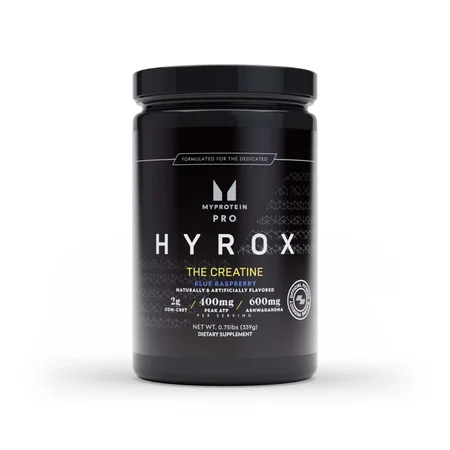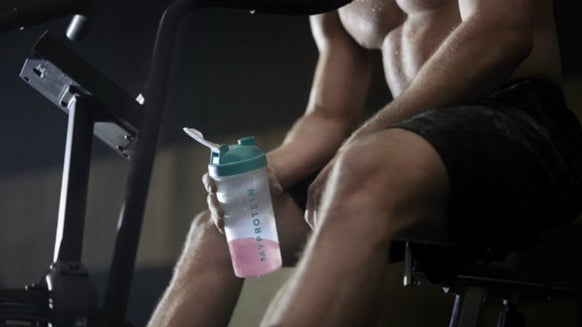
Most research on creatine up to this point has focused on creatine monohydrate, the most widely studied and commonly used form. Its effects on strength, performance, and overall health are well documented. That said, creatine monohydrate is not the only option available. Other forms exist, including creatine hydrochloride, often referred to as creatine HCL.
With multiple forms on the market, an important question is raised: what is the difference between creatine HCL and creatine monohydrate, and which is the better choice?
To understand that distinction, it helps to first look at why creatine has earned such a central place in strength training.
In the world of bodybuilding and lifting, creatine consistently ranks alongside whey protein as one of the most essential supplements, and for good reason. Creatine’s benefits are backed by decades of research, showing clear improvements in muscle strength, power output, and training capacity, all of which support muscle growth over time.
At its core, creatine is a naturally occurring compound that plays a key role in energy availability during intense exercise. Supplementing with creatine helps increase the amount stored in muscle, which gives you access to more energy reserves during exercise.
However, not all creatine supplements are the same. Read on to learn the differences between the two major forms of creatine, and which one may be right for you.
Jump to:
- What Are the Types of Creatine?
- Creatine HCL vs. Monohydrate
- What Does Creatine Do?
- Creatine HCL: Benefits & Usage
- Creatine Monohydrate: Benefits & Usage
- FAQs

What Are the Types of Creatine?
While various forms of creatine exist, the most popular are creatine HCL and monohydrate. Both HCL and monohydrate serve the same purpose: to help you achieve enhanced performance and muscle growth. However, there are differences between the two in terms of absorption rate, dosage requirements, and supporting research.
What is HCL creatine?
Creatine HCL, or hydrochloride, is creatine that is molecularly bound with hydrochloric acid to enhance its solubility and overall absorption rates. This means your body can break it down faster and your muscle cells can absorb it more easily.
HCL was introduced to help alleviate some of the negative side effects of creatine monohydrate such as water retention; some estimates suggest creatine HCL is 41 times more water soluble than creatine monohydrate1.
What is Creatine Monohydrate?
Creatine monohydrate is the original creatine supplement; it's been around the longest and is the most widely used form. Thus, monohydrate has more research supporting its efficacy than any other form of creatine. One of its main advantages is its purity, which is an extremely strong 99.8 percent. Creatine monohydrate is also generally the more affordable option.
Creatine HCL vs. Monohydrate
Creatine monohydrate is a molecule found naturally in the body and may also be ingested from food sources including seafood, eggs, and meat. It is made up of three amino acids: glycine, arginine, and methionine.
HCL is creatine that is molecularly bound with hydrochloric acid. HCL is a newer version of creatine and has not been studied as extensively as creatine monohydrate.
Is Creatine HCL Better than Monohydrate?
There are many claims surrounding creatine HCL, such as it absorbs faster than monohydrate, and thus avoids some of the latter's side effects. However, overall, there isn't sufficient research to determine which is the better form of creatine; both forms have been proven to be effective in increasing muscle mass and strength.
If you are looking for a proven supplement guaranteed to work, creatine monohydrate has a wealth of research to back it up. This includes research on its ability to increase strength, muscle recovery rates, and the ability to build muscle. However, if you're interested in trying a newer form of creatine, and you're looking to avoid some of the supplement's common side effects, creatine HCL makes for a great option.
What Does Creatine Do?
To give you some context for this popular supplement, let's explore what exactly creatine does in your body. Creatine has been shown to improve exercise performance, disorders of creatine metabolism or transport, muscle strength and mass, and age-related muscle loss (sarcopenia)2.
The primary reason athletes take creatine is to build muscle and improve performance; creatine helps with this by indirectly promoting energy production. Creatine speeds up the natural process of how our bodies regenerate Adenosine Triphosphate (ATP) - the body's immediate energy source during high-intensity exercise.
How does this work?
Supplementing creatine boosts the natural creatine stores in your body, stored as phosphocreatine in your muscle tissue. Your body utilizes phosphocreatine during high-intensity exercises, such as lifting weights, to produce ATP, providing your muscles with extra energy. This essentially helps your muscles work harder and function better during a training session.
By supplementing creatine, you can increase your body's ability to store more of it, meaning that ATP can be regenerated faster and maintained for longer during intense exercise.
Finally, creatine also pulls water into your muscle cells, increasing protein synthesis.
Creatine HCL: Benefits & Usage
Creatine hydrochloride or HCL is creatine bound with hydrochloric acid; this form of creatine is designed to be more water-soluble and more easily absorbed by the body. HCL’s permeability in the intestinal tract is also greater than that of creatine monohydrate. Because HCL is purported to be absorbed faster by muscle cells, water retention should not be a concern, and side effects of creatine monohydrate, like bloating, should be reduced1.
Additionally, the attached hydrochloric acid molecule improves the stability of the creatine.
Does creatine HCL work/is it effective?
According to the research, Creatine HCL demonstrates similar levels of effectiveness when compared to creatine monohydrate in terms of performance and strength1. In one study published in the International Journal of Food and Nutrition Research, HCL was shown to increase lean mass, decrease fat percentage, and increase strength in males aged 18-25.³
Does creatine HCL cause water retention/make you look bigger?
The effects of creatine HCL are not well studied, but in one study, just like with creatine monohydrate, creatine HCL has been shown to increase lean mass³. However, because creatine HCL does not cause as much water retention in the muscle cells as creatine monohydrate, you may not appear as “swole” when taking HCL.
What is the best creatine HCL?
The best creatine HCL will be one that is high quality, does not contain any fillers, and goes through third-party testing to ensure quality. These are some of the things you should look out for when purchasing creatine HCL.
How much creatine HCL should I take a day?
According to the research, you only need a quarter of a teaspoon a day for creatine HCL to be effective. With creatine monohydrate, many opt to begin with a loading phase and daily intake of 15 – 20 grams, and then switch to a maintenance dose of 5 grams a day. However, with HCL, this is not viewed as beneficial or necessary.
Is creatine HCL more convenient to take than creatine monohydrate?
There is little proof of this, with no formal research to demonstrate that HCL is the more convenient of the two supplements. We like a supplement that we know will work, and while you can take the word of the experts that HCL is effective in tiny doses, making it more convenient to take and transport, monohydrate is also proven to work at the aforementioned dose. At the end of the day, how inconvenient is it to mix those extra measures into your shake?
Can you take creatine HCL every day?
Yes, just like with monohydrate, Creatine HCL can be taken daily and has been shown to produce results when taken daily1.

Creatine Monohydrate: Benefits & Usage
Through the latest research, we now know about new benefits of creatine monohydrate, ranging from physical health to cognitive, that further support use of the supplement.
This popular form of creatine has been well-researched and boasts many different health benefits, such as improving neurological and cognitive function. In older adults, creatine has been linked to fatigue resistance and increased strength, muscle mass, bone mineral density, and performance of activities of daily living4. Creatine monohydrate has even been shown to improve mental health by alleviating symptoms of depression5.
Creatine Monohydrate is also proven to be safe and effective for people without pre-existing medical concerns. Its safety has also been proven in the longer term, which is good to know if you’re a repeat user of creatine supplements.
The ‘no contest’ has to rule as the same research simply doesn’t exist for creatine HCL. So, if you want the reassurance of a proven, tested product, creatine monohydrate is the one for you. Plus, monohydrate is also considered the purest form of creatine available.
Is creatine monohydrate worth taking?
If you’re looking to gain muscle mass and improve your performance at the gym in a safe way, creatine monohydrate is definitely worth a try. With tons of research to back it up and great results, monohydrate can definitely help you reach your lifting goals.
What are the side effects of creatine monohydrate?
Some people experience mild side effects such as bloating, weight gain, water retention, and gastrointestinal upset when taking creatine monohydrate. These side effects are likely due to the high dosage of creatine most people take, especially if opting for a loading phase. Lowering your dose if you experience any of these side effects will likely alleviate them¹.
How do bodybuilders use creatine monohydrate?
Bodybuilders use creatine monohydrate to increase muscle mass, energy levels, and training ability. In any form, creatine has been regularly shown to increase strength, fat-free mass, and muscle morphology in combination with heavy resistance training4. By increasing creatine storage and the rate of ATP regeneration, supplementing with creatine helps to enhance performance and training ability4.
Is creatine monohydrate a steroid?
Creatine is not a steroid and is not similar to steroids in its effect on the body. Steroids are considered drugs, while creatine is considered a natural supplement. Anabolic steroids are a synthetic form of testosterone and can increase muscle mass by increasing muscle protein synthesis through influencing the genetic expression of muscle-specific genes.
Supplementing with creatine also increases muscle protein synthesis, but by pulling water into your muscle cells. Creatine also increases ATP production, which, over time, can lead to increased muscle mass through enhanced training performance5.
When should I take creatine monohydrate?
Creatine can be taken pre and/or post-workout. Taking creatine post-workout can help provide your muscles with energy, which can help you work out harder, for longer. Doing this will break down more muscle fibers and with sufficient recovery, lead to more growth.
So, you could take 5 g before your workout and 5 g after to help aid performance, recovery, and growth. It really is up to you when you choose to take your creatine, provided you stay within the recommended daily dosage.
FAQs
Still want to know more? Read on to get answers to common questions about supplementing with creatine.
General Info, Safety, & Usage
Is creatine good for you?
In short, the research points to yes. Creatine is not detrimental to the body and actually has various positive effects. It helps you increase muscle mass and energy levels in a safe way.
Some of creatine's positive effects include boosting mood and alleviating symptoms of certain metabolic and musculoskeletal disorders, among others.
Is taking creatine safe?
Taking creatine is currently considered safe and ethical4. When taken in appropriate doses, creatine is likely safe to take for up to five years. And just like with any supplement, you'll want to ensure you choose a creatine that follows recommended manufacturing practices and goes through third-party testing to ensure quality, like Myprotein's Creatine Monohydrate Powder.⁶
How much does creatine cost?
Creatine Monohydrate will cost you about $30 for a standard size of 500 grams, while HCL creatine is more expensive per gram and will run you about $40-45 for a 500g tub.
You’ll get more bang for your buck with monohydrate. While HCL requires smaller daily doses, monohydrate compensates with a lower price per serving and usually greater volumes in each container.
How do you take creatine?
Creatine comes in either powder form or pills. With the powder, you simply mix a serving size into water or your beverage of choice and drink. With pills, the number of pills you take will depend on what your dosage is.
Determine your desired dosage and measure out how many pills make that dose, and that is what you should take. Creatine can potentially be dehydrating because it causes your muscle cells to pull water from the body. So remember to drink a lot of water when taking the supplement.
Can you take creatine every day?
Yes, you definitely can take creatine every day. Many studies have shown that creatine is effective for increasing exercise performance and strength performance when taken daily. A good way to take the supplement is to begin with a loading period and then continue with a maintenance dose long-term. During both periods, you should take creatine daily to see the best results.⁴
How quickly does creatine work?
It can take between 7 to 28 days to see the energy effects of creatine⁷.
Is it okay to take creatine before bed?
Yes, taking creatine before bed is totally fine. The supplement is not a stimulant, and thus there is no issue with taking it before bed, or whatever time of day works best for you.
Side Effects
Does creatine affect you sexually?
No evidence suggests that creatine has any sexual impact.
Does creatine raise testosterone?
Creatine has not been shown to raise testosterone levels. Many studies have reported no change in testosterone levels when subjects supplemented with creatine; this includes total testosterone, free testosterone, and DHT (the metabolite of testosterone linked to hair loss in men)5.
Does creatine affect mood?
While more research needs to be done, creatine has been shown in several studies to have a positive effect on mood. According to the Journal of the International Society of Sports Nutrition, creatine has been shown to improve mood and alleviate symptoms of depression in adolescent females5.
Additionally, another study demonstrated that creatine boosted mood in patients with Parkinson's Disease⁸. Creatine was also shown to reduce mental fatigue in healthy individuals and improve mood and reduce fatigue in sleep-deprived individuals in a clinical trial published in the Journal of Psychopharmacology⁹.
Does creatine make you lose weight?
Creatine does not help you lose weight, and you should not take the supplement if weight loss is your goal. However, creatine will help you build lean muscle mass.

What are the negative effects of creatine?
According to the research, there are no proven negative health effects for healthy individuals when taking creatine, both short-term and long-term. The health risks demonstrated applied only to those who were already diagnosed with specific health conditions like bipolar disorder or renal health disorders. For the general population, there are no known negative side effects of supplementing with creatine4.
Take Home Message
Overall, creatine HCL offers many advantages, including quicker absorption rates, reduced side effects, and smaller doses.
Creatine monohydrate, however, has been around longer than any other, with more research confirming its effectiveness, not to mention its affordability and purity. If you are uncertain whether creatine may conflict with any pre-existing medical conditions, ask your doctor before trying this supplement.
READ THESE NEXT:

Creatine Capsules vs. Powder | Which Should You Choose?
The difference between capsules and powder is not whether they work, but how you...

Should You Cycle Creatine? | A Guide to Maximizing Its Benefits
Whether you supplement consistently or cycle, your muscles can still benefit fro...

What Is Creatine? | Benefits, Dosage, & Side Effects
Cutting through the noise to provide you with the facts......

Alice Pearson is a UKVRN Registered Associate Nutritionist and UK Anti‐Doping accredited advisor, having obtained a Bachelor’s of Science in Nutrition and a Master’s of Science in Sport Nutrition. She has a specialist interest in the use of sports supplements for improving health, fitness, and sport performance. Alice has experience working with both amateur and elite athletes, including providing nutritional support to Tranmere Rovers FC and Newcastle Falcons Rugby Club. Her nutritional guidance is always supported by evidence‐based research, which she keeps up to date through continuing professional development and independent learning. In her spare time, Alice loves travelling, hitting the gym, and getting stuck into a good book. Find out more about Alice's story here.
- De Franca, E., Santana, J. O., Fernandes Yoshioka, C. A., & Avelar, B. (2015, December). Creatine hcl and creatine monohydrate improve strength but only … Research Gate. Retrieved November 22, 2022, from https://www.researchgate.net/publication/288670717_Creatine_HCl_and_Creatine_Monohydrate_Improve_Strength_but_Only_Creatine_HCl_Induced_Changes_on_Body_Composition_in_Recreational_Weightlifters
- U.S. National Library of Medicine. (n.d.). Creatine: Medlineplus supplements. MedlinePlus. Retrieved November 19, 2022, from https://medlineplus.gov/druginfo/natural/873.html
- Fernandes Yoshioka, C. A. (2019, June 27). Comparison between creatine monohydrate and creatine hcl on body composition and performance of the Brazilian Olympic Team. eSciPub Journals. Retrieved November 21, 2022, from https://escipub.com/ijfnr-2019-05-2205/
- Cooper, R., Naclerio, F., Allgrove, J., & Jimenez, A. (2012, July 20). Creatine supplementation with specific view to exercise/sports performance: An update. Journal of the International Society of Sports Nutrition. Retrieved November 19, 2022, from https://www.ncbi.nlm.nih.gov/pmc/articles/PMC3407788/
- Antonio, J., Candow, D. G., Forbes, S. C., Gualano, B., Jagim, A. R., Kreider, R. B., Rawson, E. S., Smith-Ryan, A. E., VanDusseldorp, T. A., Willoughby, D. S., & Ziegenfuss, T. N. (2021, February 8). Common questions and misconceptions about creatine supplementation: What does the scientific evidence really show? Journal of the International Society of Sports Nutrition. Retrieved November 19, 2022, from https://www.ncbi.nlm.nih.gov/pmc/articles/PMC7871530/
- Mayo Foundation for Medical Education and Research. (2021, February 9). Creatine. Mayo Clinic. Retrieved November 19, 2022, from https://www.mayoclinic.org/drugs-supplements-creatine/art-20347591
- Creatine & Creatine supplements: What is creatine, are supplements safe. Cleveland Clinic. (n.d.). Retrieved November 19, 2022, from https://my.clevelandclinic.org/health/articles/17674-creatine-and-creatine-supplements#:~:text=It%20will%20take%20seven%20to,or%20trying%20to%20lose%20weight.
- Creatine. Mount Sinai Health System. (n.d.). Retrieved November 19, 2022, fromhttps://www.mountsinai.org/health-library/supplement/creatine
- Allen, P. J. (2012, May). Creatine metabolism and psychiatric disorders: Does creatine supplementation have therapeutic value? Neuroscience and biobehavioral reviews. Retrieved November 19, 2022, from https://www.ncbi.nlm.nih.gov/pmc/articles/PMC3340488/











